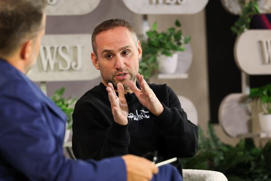
© Nikki Ritcher for the Wall Street Journal
Fanatics Inc. is late to the sports-betting game. Its chief executive thinks he has a strong hand.
On Monday, the sports-merchandise company plans to launch its first gambling app in Tennessee and Ohio, years after others entered the fast-growing market.
Competition is stiff. FanDuel Group, DraftKings Inc. and BetMGM hold an estimated 85% of the sports-betting market in the U.S.
Fanatics acknowledges it is a late-mover into sports wagering but says its database of 95 million existing customers worldwide offers an advantage. The company will connect gamblers to its rewards program for deals on merchandise, signed collectibles and access to athletes and games.
Expanding into sports-betting will test CEO Michael Rubin’s vision for a digital platform spanning businesses across sports, including sports-team gear, autographed memorabilia and trading cards.
“There’s not another company thinking about how do you give hundreds of millions—or maybe even long-term billions—of sports fans one place to do everything they want to do digitally,” said Mr. Rubin. “That’s going to be buying merchandise, buying and trading collectibles, betting on sports. Over time, watching live sports, maybe getting tickets from our place.”
Fanatics, which is privately held, said it plans to invest $1 billion in its new sports-betting division. Initially, only Fanatics customers will have access to its gambling app. It intends to add sports betting in Massachusetts and Maryland by June and be operating in 12 states by football season, when it will be open to the general public. International plans are also under way, the company said.
Mr. Rubin said he wants Fanatics to be the top sports-betting company in the world in 10 years. He said he expects the betting division to be profitable by 2025 or 2026.
Growing up in the Philadelphia area, Mr. Rubin got his entrepreneurial start at 8 years old selling vegetable seeds, later expanding to homemade stationery and a snow-shoveling service. At 12, he founded a ski-tuning business in his parents’ basement, and eventually grew it into ski-equipment shops. He dropped out of Villanova University after his first semester to focus on his business and then moved to other ventures.
In 2011, Mr. Rubin sold his e-commerce company, GSI, to eBay Inc. for $2.4 billion, earning $150 million from the deal. He bought back three of GSI’s consumer businesses while eBay focused on order fulfillment. One of those businesses was Fanatics.
Now 50, Mr. Rubin maintains a high profile in the sports world, posting on social media about hanging out with athletes and celebrities. Fanatics has a valuation of $31 billion, up from $18 billion in 2021, according to a spokesman. This year, the company said it expects to handle 62 million direct-to-consumer orders.
With sports betting, Fanatics aims to offer a gambling app that is more like Spotify and less like a Vegas sportsbook. The app suggests wagers based on customers’ favorite teams and betting preferences, similar to the music-streaming app’s suggestions based on listening history, according to executives.
Customers will receive up to 5% of every bet placed as rewards dollars, which the company calls FanCash. The rewards can be used to buy Fanatics merchandise or access experiences such as attending games or meeting athletes.
Leveraging an existing user base to grow an online sports-betting business isn’t new. Casino companies that have added online betting also have their own customer databases and promote rewards such as free nights in a casino hotel, said Jordan Bender, a gaming analyst with JMP Securities.
With Fanatics, however, every customer who bought a jersey or a cap from the company might not want to gamble, Mr. Bender said. “What’s their actual total addressable market within this database?” he said.
Fanatics assembled its betting and gaming unit with executives from the sports-betting world and consumer brands such as MTV Entertainment, food-delivery app DoorDash Inc. and bike-share company Lime.
The team is led by Matt King, FanDuel’s former CEO during its early years of fierce competition for market share.
Other sports-betting operators view casual, low-spending bettors as unprofitable customers, Mr. King said. But without spending a huge amount to acquire customers upfront, Fanatics is building a business model where every user can be profitable, he said.
Over the last five years, top gambling companies have spent billions on marketing at the expense of profits in a race to nab consumers as new states opened up to online sports betting. It has been legalized in 27 states and the District of Columbia.
Mr. Rubin said the company will only be marketing betting to customers in states where Fanatics is operating sports wagering, or soon will be. The company will also be targeting customers who are, or are likely to be, sports bettors, he said.
“We don’t want to offer anyone anything they don’t want,” Mr. Rubin said.
Fanatics has disrupted markets before. Last year, Fanatics bought the trading-card company Topps Co. for $500 million after securing an exclusive trading-card agreement for professional baseball.
Last year, Mr. Rubin sold his stake in the company that owns the National Basketball Association’s Philadelphia 76ers and the National Hockey League’s New Jersey Devils. He cited potential conflicts of interest with Fanatics’ trading-card business, which relies on contracts with thousands of athletes, and the sports-betting business.
In January, Fanatics opened the first retail sportsbook inside an NFL stadium, FedExField in Maryland, home of the Washington Commanders.
In many ways, Fanatics’ brand and Mr. Rubin’s splashy lifestyle both serve as marketing opportunities in the betting world.
The company said it researched what high-dollar VIP bettors would like most for rewards. The top choice was attending Fanatics’ annual celebrity-filled Super Bowl party, which is often chronicled on social media and involves stars and performances, such as this year’s by rapper Meek Mill.
“There’s not a high-end gambler that wouldn’t really love to be at that party,” Mr. Rubin said.
Write to Katherine Sayre at [email protected]